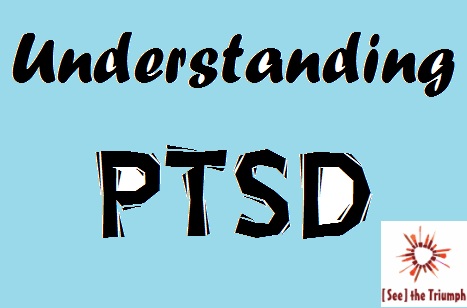|
12/9/2014 Understanding PTSDBy Allison Crowe, See the Triumph Co-Founder
For the month of December at See the Triumph, we are focusing on self-care strategies that survivors can use to cope with abuse. I wanted to share some “basics” about one of the common mental health problems associated with IPV – Post-Traumatic Stress Disorder. At See the Triumph, we believe that knowledge is power. Knowing who is impacted by the disorder, what PTSD might “look” like, and how it can be treated will hopefully help you, or someone you know not only recover but ultimately triumph over abuse. PTSD Basics For many survivors of intimate partner violence, Post-Traumatic Stress Disorder (PTSD) is an unfortunate result of an abusive relationship. It’s an anxiety disorder that people might struggle with after living through or witnessing a dangerous event. Think about it this way - when you experience a dangerous event, it is normal to feel scared. When we feel scared, these feelings trigger our bodies to prepare to defend against the danger or to avoid it (this is also called fight or flight). Fight or flight is a normal response to danger, but sometimes this response will linger well after the dangerous event no longer exists. PTSD is exactly this - a reaction that happens even when the danger no longer is there. WHO Who gets PTSD? Both adults and children can suffer from Post-Traumatic Stress Disorder. Children and adults will respond in different ways, but the disorder can impact anyone who has been through a serious event - veterans who have experienced combat, survivors of natural disasters, survivors of abuse, to name only a few. Some people who experience PTSD have not been through a serious event themselves but have a family member who has been harmed, experienced danger, or has died. WHAT What does PTSD “look” like? Here are some of the symptoms you might notice – 1. Re-experiencing symptoms: these might be flashbacks, when the trauma is relived over and over as if you are going through it again. You might have sweating, a racing heart, and other physical during a flashback. There might be nightmares of the event or thoughts during the day about the event. People, places, or objects might trigger this re-experiencing. 2. Avoidance symptoms: these are symptoms such as staying away from places, events, or things that are reminders of the traumatic experience. There might be feelings such as numbness, worry, or depression as well as a loss of interest in things that used to be enjoyable. You might begin losing memory of the event that caused the trauma. 3. Hyperarousal symptoms: these symptoms include being easily startled, feeling edgy, having difficulty sleeping, focusing, or eating. These symptoms are always there, rather than being triggered by something or someone. HOW How do I know I have PTSD? Not everyone who has been through trauma will be diagnosed with PTSD. Experiencing trauma is certainly a risk factor for developing the disorder, but seeking out support from others such as friends, family, or a mental health professional after experiencing a trauma can help people cope and respond effectively and even prevent symptoms from developing into PTSD altogether. If you find a mental health professional to talk to about the trauma you experienced, he or she will most likely use counseling, medications, or perhaps both to treat PTSD, depending on how serious the symptoms are. Often the first step is just talking about the event to someone who is professionally trained to listen and assist. When choosing a therapist, counselor, or other mental health professional, we suggest asking important questions about whether the professional has training in intimate partner violence and trauma, so take a look at our past post on finding a competent counselor for survivors of IPV here to make sure you ask the right questions as you seek mental health treatment: http://www.seethetriumph.org/blog/finding-a-counselor-who-is-competent-to-serve-survivors PTSD is a challenging mental health consequence of surviving a traumatic event. I hope that by knowing some of the “basics” of the disorder you feel empowered and educated as you, or someone you know recovers and ultimately triumphs over abuse. Information retrieved from http://www.nimh.nih.gov/health/publications/post-traumatic-stress-disorder-ptsd/index.shtml Comments are closed.
|
Archives
July 2024
CategoriesAll About Intimate Partner Violence About Intimate Partner Violence Advocacy Ambassadors Children Churches College Campuses Cultural Issues Domestic Violence Awareness Month Financial Recovery How To Help A Friend Human Rights Human-rights Immigrants International Media Overcoming Past Abuse Overcoming-past-abuse Parenting Prevention Resources For Survivors Safe Relationships Following Abuse Schools Selfcare Self-care Sexual Assault Sexuality Social Justice Social-justice Stigma Supporting Survivors Survivor Quotes Survivor-quotes Survivor Stories Teen Dating Violence Trafficking Transformative-approaches |
Search by typing & pressing enter



 RSS Feed
RSS Feed